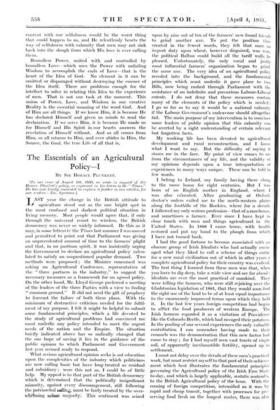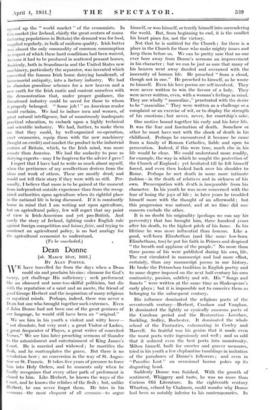The Essentials of an Agricultural Policy —I
By SIR HORACE PLUNKETT.
Tin our issue of .August 01h, 1930, we wrote in support of Sir Horace Pluttkdes policy, as expressed in his letters to the ' Times." He has now kindly consented to explain it further in two articles, for our readers.—En. Spectator.] TAST year the change in the British attitude to a agriculture stood out as the one bright spot in the most confused and darkest political situation in living memory. Most people would agree that, if only through the universal resort to wireless, the British democracy was never so widely informed. Be this as it may, in some letters tc the Times last summer I was moved and permitted to point out that Parliament was giving an unprecedented amount of time to the farmers' plight and that, in no partisan spirit, it was insistently urging the Government to declare an agricultural policy calcu- lated to satisfy an unquestioned popular demand. Two methods were proposed ; the Minister concerned was asking an Agricultural Conference, representative of the " three partners in the industry," to suggest the necessary measures as a framework for an agreed policy. On the other hand, Mr. Lloyd George preferred a meeting of the leaders of the three Parties with a view to finding " common ground." It did not need the gift of prophecy to forecast the failure of both these plans. With the minimum of destructive criticism needed for the fulfil- ment of my purpose, I felt it might be helpful to submit some fundamental principles, which a life devoted to the study of agricultural problems had convinced me must underlie any policy intended to meet the urgent needs of the nation and the Empire. The situation briefly indicated above has so radically changed that the one hope of saving it lies in the guidance of the public opinion to which Parliament and Government last year seemed ready to respond.
What serious agricultural opinion seeks is not education upon the complexities of the industry which politicians are now calling basic but have long treated as residual and subsidiary ; were this not so, I could be of little help. My appeal is to that part of the British democracy which is determined that the politically insignificant minority, against every discouragement, still following the patriarchal calling, must be fairly treated by the over- 1A-timing natal' majority. This sentiment was seized upon by nine out of ten of the farmers' new found friends to grind another axe. To put the position thus created in the fewest words, they felt that once all import duty upon wheat, however disguised, was won, the political Balbus could build all the tariff walls he pleased. Unfortunately, the only vocal and justly most influential farmers' organization began to grind the same axe. The very idea of an agricultural policy receded into the background, and the fundamental principles which must underlie it gave place to two Bills, now being rushed through Parliament with the assistance of -an indefinite and precarious Labour-Liberal entente. I do not deny that these measures contain many of the elements of the policy which is . needed : I go so far as to say it would be a national calamity if the Labour Government's endeavour should altogether fail. The main purpose of my intervention is to convince some leaders of public opinion that this calamity can he averted by a right understanding of certain relevant but forgotten facts.
My working life has been devoted to agricultural development and rural reconstruction, and I know what I want to say. But the difficulty of saying it stares me in the face. My point of view comes to me from the circumstances of my life, and the validity of my opinions depends upon a true interpretation of experiences in many ways unique. These can be told in few words.
I belong to Ireland, my family having there dung to the same home for eight centuries. But I was born of an English mother in England, where I was also educated. After graduating at Oxford. doctor's orders exiled me to the north-western plain, along the foothills of the Rockies, where for a &each I followed my only serious profession—that of a ranchman. and sometimes a farmer. Ever since I have kept i I close touch with men and things agricultural in thl United States. In 1888 I came home, with health restored and put my hand to the plough from whicl I have not turned back.
I had the good fortune to become associated with in, obscure group of Irish Idealists who had actually envis- aged what they liked to call a scheme of things entire for a new rural civilization out of which in after years ;I complete agricultural policy for their country was evolved.
The first thing I learned from these men was that, when you have to dig deep, take a wide view and see far ahead : idealists arc ever the most practical of mankind. They were telling the farmers, who were still rejoicing over the Gladstonian legislation of 1881, that they would soon find the right use of the land to be of at least equal importance to the enormously improved terms upon which they held it. In the last few years foreign competition had beano to afflict the food producers of western Europe. The- Irish farmers regarded it as a visitation of Providence like the Colorado Beetle, which had ravaged their potatoc, In the pooling of our several experiences the only valuable contribution I can remember having made to their counsels was the demonstration that this new factor had come to stay ; for I had myself seen vast tracts of virgin soil, of apparently inexhaustible fertility, opened up to settlement.
I must not delay over the details of these men's practical work, but must restrict myself to that part of their achieve- ment which best illustrates the fundamental principles governing the Agricultural policy of the Irish Free State to-day, and-which is. largely applicable, mutatis mutamlis, to the British Agricultural policy of the hour. With the coming of foreign competition, intensified as. it was by rapid and cheap transit, together with processes for pre- serving food fresh on the longest routes, there was also opened up the " world market " of the economists. In this market (for Ireland, chiefly the great centres of manu facturing populations in Britain) the demand was for food, supplied regularly, in bulk of uniform quality. Irish butter was almost the only commodity of common consumption in respect of which these-hard conditions had been waived, .because it had to be produced in scattered peasant homes: Suddenly, both in Scandinavia and the United States new machinery, particularly the separator, was invented which converted the famous Irish home dairying handicraft, of immemorial antiquity, into a factory industry. We had to abandon grandiose schemes for a new heaven and a new earth for the Irish rustic and content ourselves with the demonstration that, under proper guidance, the threatened industry could be saved for, those to whom it properly belonged. "Some job ! " an American reader would exclaim. We had to induce men and women, of great natural intelligence, but of monstrously inadequate practical education, to embark upon a highly technical and scientific industry. We had, further, to make them see that they could, by well-organized co-operation, erect creameries, equip them with the new machinery (bought on credit) and market the product in the industrial centres of Britain, which, to the Irish mind, was more remote than America. We had the audacity to pose as dairying experts—may I be forgiven for the advice I gave !
I regret that I have had to write so much about myself, when the pertinence of my recollections derives from the ideas and work of others. These are mostly dead; and would not tell their story if they were with us still. Per- sonally, I believe that more is to be gained at the moment from independent outside experience than from the recog-, aired authorities upon agriculture when its rightful place in the national life is being discussed. If it is constantly borne in mind that I am writing not upon agriculture, but on agricultural policy, few will regret that my point of view is Irish-American and yet pro-British. And surely the story of Ireland, fighting under English rule against foreign competition and laissez faire, and trying to construct an agricultural policy, is no bad analogy for the agricultural economist to understand.
(To be concluded.)









































 Previous page
Previous page